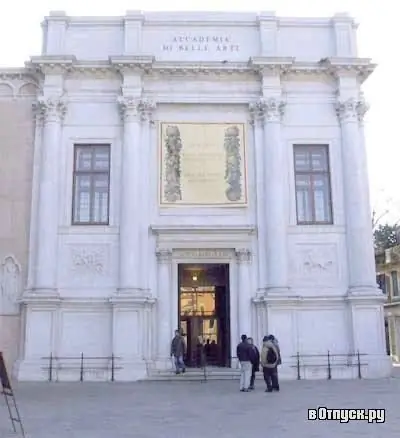
Description of the attraction
The Accademia Gallery, also known as the Accademia Museum, is one of the largest museums in Venice, located on the banks of the Grand Canal in the Dorsoduro area and contains a huge collection of Venetian painting from the 14th-18th centuries. In fact, there are several galleries at once. They were founded in 1750 at the initiative of the Senate of Venice as a school of painting, sculpture and architecture. The idea of the Senate was to transform Venice into the center of art education in Italy, along with Rome, Florence and Milan. In addition, it was one of the first institutions in Italy to study the restoration process at the end of the 18th century. Initially, the school bore the name of the Academy of Fine Arts, and in 1807 it became known as the Royal Academy and, by order of Napoleon, occupied the building in which it is located today.
A little later, closer to the middle of the 19th century, the galleries were turned into a museum, and the creation of museum funds began. Today you can see the works of the greatest Venetian masters of the past - Paolo and Lorenzo Veneziano, Giovanni Bellini, Giorgione, Lorenzo Lotto, Veronese, Tintoretto, Titian, Tiepolo, Canaletto and many others.
According to the name of the Academy Gallery, one of the four bridges of Venice thrown across the Grand Canal was named - the Accademia Bridge. It connects the building of the Gallery - the building of the former convent and school of the Scuola Grande di Santa Maria della Carita - and the urban area of San Marco. For the first time, the idea of building this bridge arose back in 1488, but the construction itself took place only in 1854. The bridge was designed by Alfred Neville, who created it in the form of an original steel structure. At the beginning of the 20th century, the bridge was replaced by a wooden one, since, as contemporaries believed, it did not fit into the urban landscape, and in 1985 a new bridge was built in its place, while retaining the appearance of the original structure.






